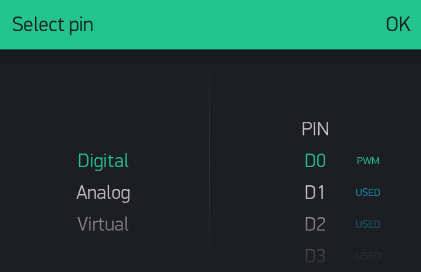I thought that by selecting digital pin I will see the states of the pins, but nothing changes 

You aren’t getting confused between the D numbers on the Blynk digital pins and the D numbers printed on the NodeMCU are you?
Pete.
I do not know how to use this D numbers 
I thought this was GPIO?
The D number in the app is GPIO.
Your pin in the top left of the picture - I think labelled Relay2 is GPIO16
The one next to it (Relay1 ?) is GPIO5
I was just wondering if you mixed these up when you set-up your labelled value widgets?
Pete.
Yes I would like to see the state of nodemcu pin at boot
Yes Rly 1 is D1 so GPIO5 and Rly 2 is D0 so GPIO16
I could read pin with digital read
but I don’t have any available pin to display the values 
and Blynk.virtualWrite(V128, value) isn’t supported 
I’ve just been doing some playing around with a Sonoff that’s running some Blynk code.
If I put a labelled value widget on GPIO 12 (the relay) it stops the Sonoff from working.
If I swap that for a Buton widget then the Sonoff works, but the button doesn’t update when I operate the relay using the physical switch. If I toggle the button widget then the relay toggles!
If you’ve run out of V-pins then you could add another device and use Bridge to update them.
Or use terminal to show the data?
Pete.
I have the same issue !
I think you have to remove the V for it to work for vPins above 127
I will try but I remember I have used label widget with blynk.virtualWrite(128, value) and it doesn’t display anything.
I will try again.
I don’t see anything above 127,
I can currently use it with Python… haven’t tested recently with C++… but I seem to recall doing so in recent past.
blynk.virtual_Write(128, 'OFF')


Very interesting, I’ll test before going to sleep.


Even works with API…
http://10.10.3.13:8080/5fb55413762b400cbb979111b630b9af/update/V128?value=hia

Device selector reduces repeated widgets.
My bad. I was looking at BLYNK_WRITE(pin) where pin <= 127. I don’t see a restriction with Blynk.virtualWrite. It seems to pass whatever value you specify. If the server accepts values greater than 127, you should be good.
template <typename... Args>
void virtualWrite(int pin, Args... values) {
char mem[BLYNK_MAX_SENDBYTES];
BlynkParam cmd(mem, 0, sizeof(mem));
cmd.add("vw");
cmd.add(pin);
cmd.add_multi(values...);
static_cast<Proto*>(this)->sendCmd(BLYNK_CMD_HARDWARE, 0, cmd.getBuffer(), cmd.getLength()-1);
}
What are you trying to do? Receive a value on the device from the server using the BLYNK_WRITE macro (which involves one and only one parameter … pin)? Or send a value from the device to the server?
to write a value to label widget on v128
Blynk.virtualWrite(128, "nok");
Right?
ooopss, I’m tired 